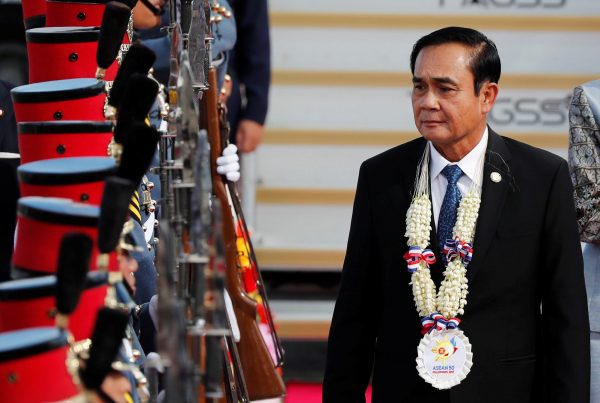A survey of 1800 former and current Thai officials conducted from 2014–17 on Thailand’s relationship with great powers demonstrates that despite Bangkok’s reputation for hard realism in its foreign policy, ASEAN surprisingly seems to matter a great deal to Thailand in terms of regional security and prosperity.
Respondents considered ASEAN to be very important in terms of regional prosperity, with 72.3 per cent rating it eight or higher (very important) out of ten on the Likert scale. In terms of ASEAN’s importance to security and stability, the rating was not as high but still significant, with 67.36 per cent rating it eight or higher.
Positioned centrally among the mainland Southeast Asian states and with relatively advanced infrastructure, Thailand benefits from closer integration with its Southeast Asian neighbours. That benefit is shared across the region as the reach of transport and infrastructure projects increases.
Not surprisingly, Thai respondents saw the advent of the ASEAN Economic Community in 2015 as a positive development. Intra-ASEAN trade is now bigger than trade with any single external partner. In Thailand’s case, exports to ASEAN are bigger than exports to China, the United States, Japan or the European Union. As ASEAN’s share of world gross domestic product continues to increase, this market of more than 640 million will offer opportunity to reduce reliance on external powers.
Security is a more complicated question. While the creation of ASEAN was never ostensibly about any form of mutual security pact, its formation always had a security dimension that was internal to ASEAN rather than external. After the US withdrawal from Vietnam and the consolidation of communist regimes in mainland Southeast Asia, Thailand decided to prioritise relations with its neighbours. For Thai policymakers, ASEAN has remained integral to Thailand’s security and is perceived as almost an article of faith.
Yet this faith is not blind and Thai respondents frequently pointed out ASEAN’s shortcomings. There is no expectation that ASEAN will present a unified front to the world in political or foreign policy terms. A senior Thai prime ministerial adviser argued that ‘if ASEAN was a nation it would be very mixed. Brunei is a monarchy, others are communist. Some are democracies, some are not. Some are Buddhist, while others are largely Muslim or Christian’. Similarly, a serving Thai military officer declared that making progress on security, humanitarian assistance or even joint task forces would take time because of the differences in politics, economies and levels of prosperity.
Balancing the great powers is a key issue for Thailand. ASEAN now organises a wide range of meetings to help member states’ relations with external powers. One officer declared: ‘In ASEAN I speak with many people. They don’t want the superpowers to come in and dominate. That is the concept. There are various mechanisms to balance the powers’.
This task is complicated further by China’s growing influence across the region, notably in Cambodia and Laos. Like these two countries, Thailand is on a path of integration with the Southeast Asian mainland, including with southern China. The greater interconnectedness with China impinges on member states’ perceived freedom of political and economic action.
History plays a role too. As noted by one senior intelligence official, the unity of ASEAN is ‘a little bit weak and shaken’ because of the past: ‘Thailand, for instance, used to invade Laos and Cambodia, and Myanmar invaded Thailand. That makes achieving consensus within ASEAN all the more difficult’. As suggested by the same intelligence official, ASEAN members will need to learn how to forgive and overcome past grievances if the organisation is to become ‘stronger and more united’.
Despite the enduring reasons for distrust and enmity, countries involved in various ASEAN-related forums remain eager to participate — in part to keep a check on each other’s intentions and initiatives. In the case of the ASEAN Defence Ministers Meeting Plus (ADMM Plus) forum, the significant work undertaken by expert working groups feeds into the ADMM Plus summits and provides much of the detail for the practical application and development of ideas to enhance collaboration. Collaboration in the ADMM Plus realm covers the domains of cyber security, humanitarian assistance and disaster relief, maritime security, peace-keeping operations, and military medicine and humanitarian mine action.
Progress has been slow and steady but over time these groups have generated significant outcomes, including seminars, workshops, exercises and conferences. Combined, they provide an extraordinary range of opportunities for enhanced cooperation, increased mutual understanding and familiarity with other member states.
In essence, the Thai establishment sees ASEAN as a proto-great power. Thanks to the perpetuation of the notion of ASEAN centrality and despite its remarkable diversity, ASEAN gives comfort to its members that their otherwise relatively insignificant international roles amount to more than the sum of their parts. That sense of centrality, fragile though it is, has been perpetuated through the various forums that have ASEAN at their core. Thais argue that it remains in the interests of the member states for this centrality to continue. But in an era of growing great power contestation that may be increasingly difficult.
John Blaxland is Professor of International Security and Intelligence Studies at the Strategic and Defence Studies Centre and Director of the Southeast Asia Institute, The Australian National University.
Greg Raymond is a Research Fellow in the Strategic and Defence Studies Centre at The Australian National University, and co-editor of the journal Security Challenges.
This article appeared in the most recent edition of East Asia Forum Quarterly, ‘Why ASEAN matters’. John Blaxland and Greg Raymond’s research was funded by the Minerva Research Institute.

